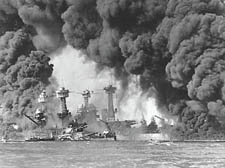|
|
 |
| |

USS West Virginia and USS Tennessee after the Japanese attack on Pearl Harbour, December 7, 1941 |
Exploding the myths of warA collection of war stories casts a disturbing light on well-worn accounts of events, writes Bruce Kent
Human Smoke: The Beginnings of World War II, The End of Civilization.
By Nicholson Baker.
Simon and Schuster £20. order this book
HUMAN Smoke is a fascinating collection of news items – many drawn from the New York Times; diary quotations; official memos and personal letters. There must be well over 1,000 of them. They cover the period from the end of the First World War to the first years of the Second.
Nicholson Baker does not try to weave a story out of them. They tell their own story and need no gloss.
Taken together they provide a different slant on the “normal” account of the rise of Hitler and the threat from Germany and Japan. Many come from the notes and letters of ordinary people who were hoping against hope that the discrimination and cruelty experienced by so many would only be a temporary phase.
What does come over very clearly is that the British and the Americans were well aware of the persecution in progress, especially of the Jews, but did not intend to do much about it.
President Roosevelt in particular was not prepared to raise the level of immigration quotas. His wife Eleanor was openly anti-Semitic, at least in her early days. Anywhere would do for the Jews – Africa, South America, Palestine (within limits) – but not in our backyard thank you very much.
A different slant is also evident on the Japanese attack on Pearl Harbour. I was brought up to believe that this was a dastardly surprise attack, which came quite out of the blue. The accounts in this book tell a different story.
For years the US had been supporting the Chinese against the Japanese, even by supplying bombers with US pilots. Great US pressure was put on the Japanese whose own conduct (the Nanking massacre of 1937) had been barbaric. There was an economic and oil blockade.
The Pacific was thought of as a US lake and that was the way the White House wanted it to remain. One US Admiral reported to his superiors, in a private memo, that to base the fleet in Pearl Harbour in the middle of the Pacific was both a provocation and a major risk.
We hear much these days of the dangerous doctrine of the right to pre-emptive attack. That is what the Japanese military must have judged Pearl Harbour to have been.
The story of indiscriminate bombing also gets a different history. Coventry, so I supposed, was the start of that business. Not at all. The bomber was our means of attack from the start of the Second World War.
The RAF conducted raids on many German cities prior to the Coventry attack.
Of course there were supposed to be specific targets but accurate bombing by night was not a possibility. Even to hit the right city was as much as some bombers could manage.
As Bishop George Bell, who spoke out so bravely against attacks on civilian targets, found out, ethics and legality had rapidly given way to no-holds-barred bombing.
It is clear that Churchill really wanted a Coventry, or something like it, which would bring America into the war. He had to wait until Pearl Harbour, but meanwhile, with various subterfuges Roosevelt did manage, thankfully, to supply Britain with many bombers and other essential bits of military equipment.
That this country was actually blockading the Continent in the early days of the war and thus preventing food imports and causing starvation was all news to me. I grew up in the belief that it was we, and only we, who were being blockaded and that was what the Atlantic submarine war was all about. That there was an American public campaign to get food through our blockade to help to feed the French was some surprise.
There are also new twists to the story of armaments. I had no idea that the French had a contract to build tanks for the German army. I did know that Britain had supplied war materials, notably rubber and nickel in large quantities, up to July of 1939. Sir Thomas Inskip, for the Government, explained when criticised in 1939 that “such exports do help Germany to re-arm, but it is a commercial matter, not within the province of the Government to interfere”.
Regrettably there is nothing in this collection about the rise and fall of the 1932 League of Nations Disarmament Conference. Britain contributed substantially to the collapse of that initiative. We were not going to tolerate an American navy larger than our own, and the bomber was a necessary means of effective policing for those who had empires to police.
Churchill had more extreme ideas. “I am strongly in favour of using poison gas against uncivilised tribes.”
This is not just a book that presents different perspectives on past times. It is also a book of sadness, lost opportunities and lost lives.
True, it is dedicated to some pacifists but it is not only for pacifists. It will help us all to look more critically at present dangers.
|
 |
|
 |
 |
|
 |
|



